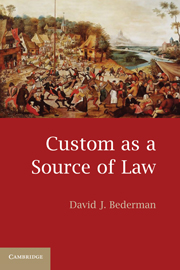5 - Family Law
Published online by Cambridge University Press: 05 June 2012
Summary
Custom continues to permeate almost all realms of contemporary law. This may seem a highly surprising and counterintuitive proposition. The anthropological, cultural, sociological, and economic perspectives revealed earlier might lead to a conclusion that customary law is a historic relic, an artifact of primitive law that has no place in modern, highly sophisticated legal systems. But this would be a profoundly mistaken position to embrace. Rather, customary norms continue to exist side by side with other mechanisms of positive law-making: constitutions as fundamental law, statutes adopted by legislatures, and case precedents decided by judges. More than merely subsisting within established legal orders, customary law regimes reinforce and strengthen existing systems of rules by anchoring them to the experiences and legal judgments of the relevant communities that follow those rules. In short, custom is no mere souvenir of bygone law; it is an integral and coherent part of any healthy, functioning contemporary legal system.
This part unfolds by examining five distinct realms of domestic legal regimes: family law, property, contracts, torts, and constitutional law. This sequence is by no means serendipitous. One possible critique of the continued relevance of customary law is to confine its applicability to purely “private law” topics. For sure, custom in domestic legal orders often has its greatest impact on norms related to the ownership and transmission of property, the enforcement of promises, and redress for civil wrongs. One of the central propositions of this volume is that custom remains a potent force in such purely public law domains as constitutional law and the law of nations. Indeed, custom may have especial force in those legal systems where determinations of status (especially family status), which combine both public and private law elements, are at issue. Within each of these five fields of domestic law, problems of the recognition and application of customary norms will be broadly reviewed in a comparative context. While the focus of the narrative will largely be devoted to the role of custom in common-law systems, in general (and in United States law, in particular), this will not invariably be the case in all instances. The goal here is to provide as wide a conspectus as possible of the character of customary law regimes as a part of the “living law” of contemporary domestic orders.
- Type
- Chapter
- Information
- Custom as a Source of Law , pp. 57 - 67Publisher: Cambridge University PressPrint publication year: 2010



